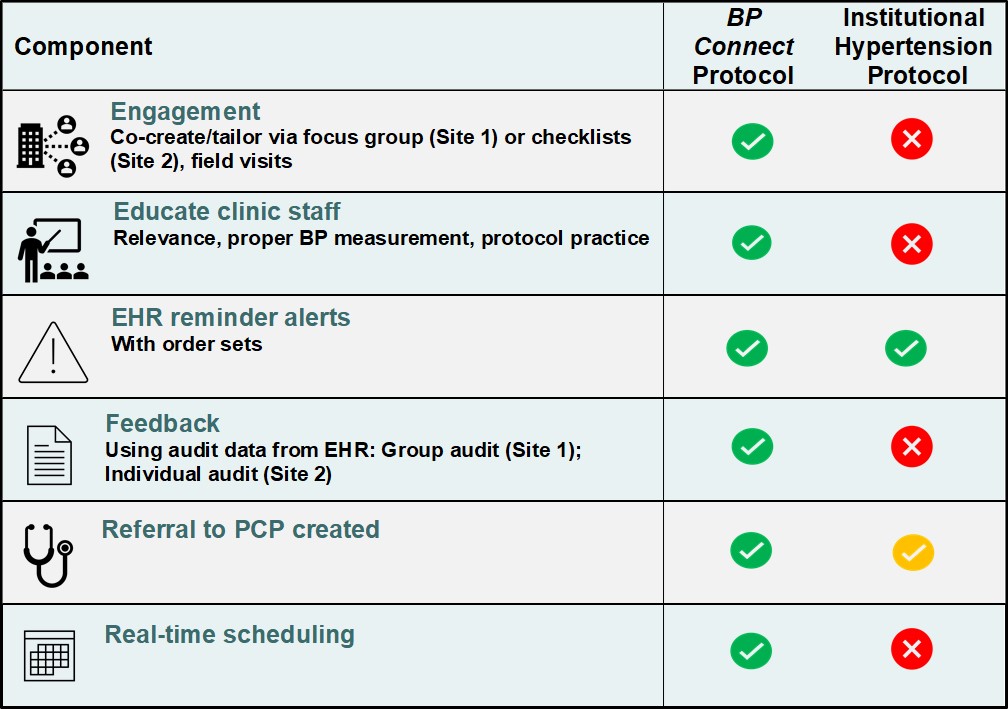Session Information
Date: Sunday, November 7, 2021
Title: Measures & Measurement of Healthcare Quality Poster (0623–0659)
Session Type: Poster Session B
Session Time: 8:30AM-10:30AM
Background/Purpose: Many rheumatic diseases increase risk of cardiovascular disease, yet an important modifiable cardiovascular risk factor, high blood pressure (BP), often remains unaddressed during rheumatology visits. BP follow-up and control are also ACR quality measures. Some clinics have hypertension (HTN) protocols for clinic staff, however, various factors related to time constraints, technology limits, and specialty clinic staff buy-in, threaten uptake and sustainability. Our objective was to implement a tailored EHR-supported specialty clinic staff HTN protocol to empower clinic staff to confirm high BP and connect patients through follow-up orders or direct scheduling with primary care to address high BP.
Methods: We engaged 2 groups of medical assistants at urban (Site 1) and suburban (Site 2) academic rheumatology clinics to participate in the ‘BP Connect’ protocol to compare effectiveness vs a prior institutional HTN protocol (Fig 1). Site 1 staff participated in a pre-intervention tailoring focus group and then monthly group audit-feedback on performance; Site 2 staff completed a pre-intervention tailoring checklist and monthly individual audit-feedback. EHR alerts instructed staff to re-measure BP if ≥ 140/90 and triggered education and offered scheduling of primary care follow-up if 2nd BP ≥ 140/90. Both groups received 1-hour education on HTN, cardiovascular risk in rheumatology, and hands-on BP measurement training and talking point practice. Using EHR data, we assessed how often staff re-measured high BPs, and if primary care follow-up was offered or accepted. The first 2 and last 2 months of the institutional process (protocol duration > 3 yrs) were compared to the 2 month BP Connect intervention period to report rate ratios (RR) and 95% CI’s.
Results: We compared 269 BP Connect eligible intervention period visits with BPs ≥ 140/90 to 310-322 baseline visits at Site 1, and 27 intervention period visits to 15-37 baseline visits at Site 2 (Table 1). Baseline versus BP Connect period BP re-measurement rates at Site 1 ranged from 56-79% vs 74%. At Site 2, re-measurement rose from 20-81% baseline to 96% with BP Connect. After confirmed high BP, primary care referral offer rates rose at both sites. Site 1 increased from 22-37% to 68%, and at Site 2 offers increased from 50-67% to 100%. Across both sites, offered (RR 1.74 [1.41, 2.17]) and accepted primary care follow-up visits increased (RR 2.00 [1.21, 3.31]) in the BP Connect period even post-COVID.
Conclusion: A tailored rheumatology clinic staff intervention at sub/urban academic rheumatology clinics improved frequency of BP re-measurement, offers, and accepted primary care follow-up beyond an untailored HTN protocol. It appears staff engagement with checklist tailoring was similar to a focus group (Site 2 vs. 1). Overall, BP Connect’s engagement, participatory education, and audit-feedback, components absent from the institutional protocol, appeared to improve performance. A trend suggests individual vs group audit-feedback may be more effective at improving performance which could inform future dissemination studies. BP Connect’s tailored implementation improved rheumatology staff performance to connect primary care follow-up of high blood pressures.
To cite this abstract in AMA style:
Gazeley D, Messina M, Ramly E, Rosenthal A, Lapp L, Stewart L, Bartels C. Tailored BP Connect Protocol with Implementation Support for Rheumatology Clinic Staff Exceeds Non-tailored Protocol at Improving Primary Care Referrals for Blood Pressure Follow-up [abstract]. Arthritis Rheumatol. 2021; 73 (suppl 9). https://acrabstracts.org/abstract/tailored-bp-connect-protocol-with-implementation-support-for-rheumatology-clinic-staff-exceeds-non-tailored-protocol-at-improving-primary-care-referrals-for-blood-pressure-follow-up/. Accessed .« Back to ACR Convergence 2021
ACR Meeting Abstracts - https://acrabstracts.org/abstract/tailored-bp-connect-protocol-with-implementation-support-for-rheumatology-clinic-staff-exceeds-non-tailored-protocol-at-improving-primary-care-referrals-for-blood-pressure-follow-up/


